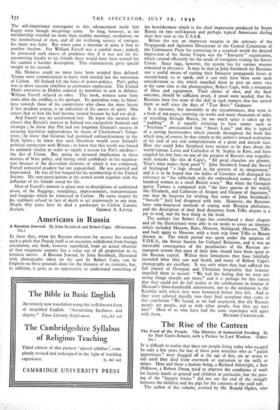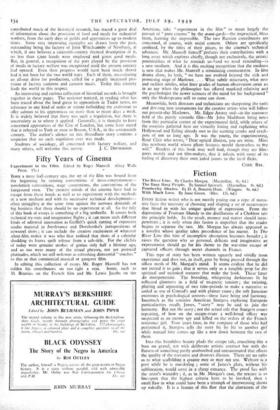The Rise of the Canteen
IT is difficult to realise that there are people living today who escaped by only a few years the fate of those poor wretches who as "parish apprentices" were dragged off at the age of five, six or seven to toil until they died from overwork or starvation in the mills or mines. Here and there a human being, a Richard Arkwright, a Sam Oldknow, a Robert Owen, tried to improve the conditions of work for factory hands in general and children in particular, but the pass- ing of the "hungry forties" did not see the end of the struggle between the children and the pigs for the contents of the swill tub.
The author of this volume, assisted by Mr. Ronald Ogden, who contributed much of the historical research, has traced a great deal of information about the provision of food and meals for industrial workers, from the early days of guilds and apprentices up to modern times. Some very interesting examples are drawn from the past, outstanding being the factory of John Wincheornbe of Newbury, at which, if one believes a sixteenth-century rhymed description of it, no less than ',ow hands were employed and given good meals. But, in general, a recognition of the part played by the provision of meals in factory welfare was exceptional until the present century had opened. Even then progress would have been much slower had it not been for the two world wars. Each of them, necessitating an all-out drive for production, called for a greatly increased pro- vision of factory canteens and canteen meals. Today this country leads the world in this respect.
An interesting and curious Collection of historical records is brought together in these pages. The reviewer noticed, in reading what has been traced about the food given to apprentices in Tudor times, no reference to any kind of order or statute forbidding the craftsman to offer salmon to his apprentices on more than so many days a week. It is widely believed that there was such a regulation, but there is uncertainty as to where it applied. Generally, it is thought to have concerned apprentices of the City of London, but some have stated that it referred to York or even to Boston, U.S.A., in the seventeenth century. The author's silence on this threadbare story confirms a suspicion that no such regulation ever was made.
Students of sociology, all concerned with factory welfare, and
many others, will welcome this survey. J. C. DRUMMOND.



































 Previous page
Previous page